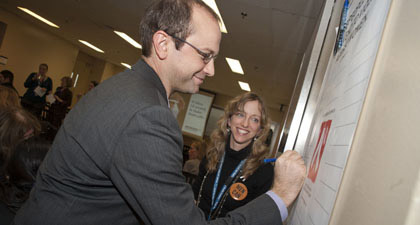TORONTO — Violence against women is a serious health-care issue, said a family physician and a member of Mount Sinai Hospital’s violence against women awareness committee.
Dr. Anne Biringer was speaking at Mount Sinai on Dec. 6, the 20th annual National Day of Remembrance and Action on Violence Against Women. The day marks the anniversary of the Montreal Massacre of Dec. 6, 1989, at L’École Polytechnique in Montreal, where 14 young engineering students were shot and killed.
Also speaking was Mike Layton, Toronto councillor for Ward 19, who is active on the White Ribbon Campaign to end male violence against women. He’s the son of the late NDP leader Jack Layton, who was part of a handful of men who decided in 1991 that they had a responsibility to urge men to speak out against violence against women.
Speaking about intimate partner violence, Biringer said that all women are at risk, but all women are not at equal risk.
“The women may present themselves at any part of the hospital – to the emergency room, the dentist, a social worker – with any number of ailments including broken bones, abdominal pain, palpitations or psychological issues.
“Health-care providers need to identify the issue, be aware of ‘recurrent’ accidents and provide medical care and support in a confidential environment. We must let women know they are not alone, and they are not to blame.”
Biringer said that if a woman says that she has been abused, “we have to believe her, ask her if she is safe, and provide her with resources. If children are in danger, we need to call [children’s] aid.”
Layton said that he is saddened that “we still need to be here, that there is still such hurt, hate, and despair.
“I am also saddened that as men, we haven’t broken the bonds of violence against women. Many men have worked hard, but violence and inequality persevere. It makes me upset and angry.”
For many, he said, violence is passed down to the next generation, and “that needs to stop. Violence against women causes as much death in women of reproductive age, as cancer.”
The men who started the White Ribbon Campaign understood that in order to stop male violence, they had to confront the males, he said.
“We need to educate men that violence against women cannot be tolerated. Jack decided on the white ribbon, because it is a visible symbol, [which] can lead to dialogue and awareness,” Layton said.
The campaign, which started out in his bedroom in his father’s house, he said, tries to conquer violence in both directions. “We must do all we can to stop violence, and remove women from violence. We must continue to show that love is better than anger.”
Christine Bradshaw, a social worker, and co-chair of the hospital’s violence against women committee, said the committee started in 1977 in response to the death of a woman who was murdered by her husband. “If it had been properly assessed, [perhaps] her death could have been prevented.”
The original goals of the committee persist today, she said, “to [let people know] that violence against women is a serious issue.”
